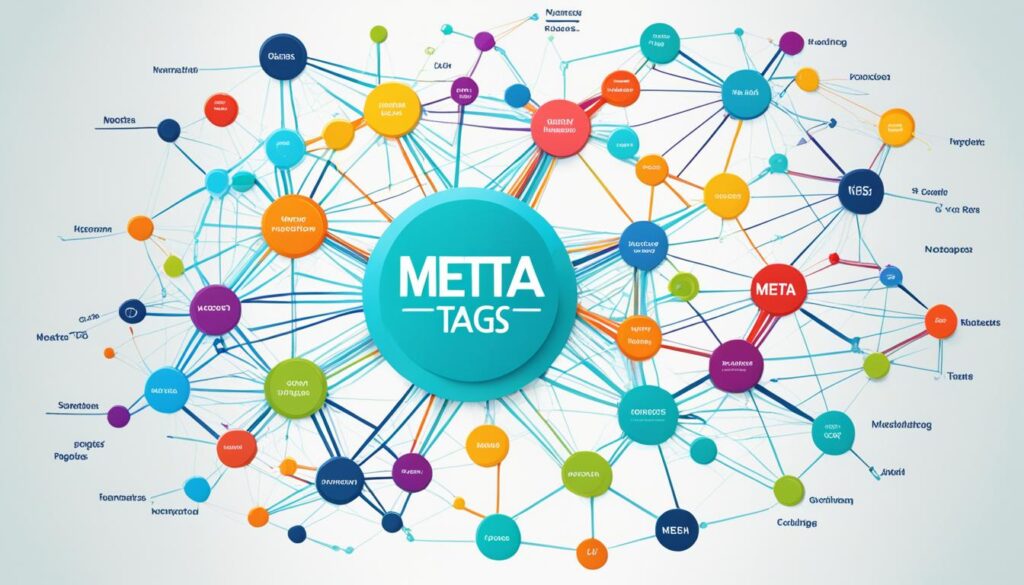
Meta tags are a crucial element in optimizing a website for both search engines and user experience. They provide valuable information about the content of a web page and help search engines understand what the page is all about. By optimizing meta tags, you can improve your website's visibility in search engine results pages (SERPs) and enhance the overall user experience for visitors.
In this section, I will explore the importance of meta tags, the different types of meta tags, and the best practices for optimizing them. By the end of this article, you will have a clear understanding of how to leverage meta tags to improve your website's SEO and create a better experience for your users.
Key Takeaways:
- Meta tags are HTML elements that provide metadata about a web page.
- Optimizing meta tags can improve your website's visibility in search results.
- The two most important meta tags for SEO are the meta title and meta description tags.
- There are other types of meta tags that can be optimized for SEO, such as the meta viewport and meta robots tags.
- When optimizing meta tags, it is important to include relevant keywords and keep them concise and informative.
Now, let's delve into the importance of meta tags in SEO and how you can optimize them to drive organic traffic and enhance the user experience on your website.
The Importance of Meta Tags in SEO
Meta tags play a crucial role in optimizing a website for search engines and improving its ranking. These HTML elements provide essential metadata about a web page and help search engines understand its content and relevance to user queries. While meta tags are not visible on the page itself, they are included in the page's source code.
When it comes to SEO, two meta tags are particularly important: the meta title tag and the meta description tag. The meta title tag appears as the clickable headline in search engine results, while the meta description tag provides a concise summary of the page's content.
Optimizing meta tags with relevant keywords is key to improving a website's visibility in search results and increasing organic traffic. By carefully crafting these tags with strategic keywords, website owners can attract more visitors and drive targeted traffic to their pages.
Meta tags are the first point of contact between your website and search engines. By optimizing them, you can significantly enhance your website's chances of ranking higher in search engine results and attracting valuable organic traffic.
It's important to note that meta tags alone are not the only factor that influences a website's ranking. However, they play a crucial role in signaling the relevancy of a web page to search engines, making them an essential part of any SEO strategy. By optimizing meta tags, website owners can improve their chances of ranking higher and gaining more visibility in search engine results pages.
Why Meta Tags Matter for SEO
- Meta tags provide key information about a web page's content to search engines.
- Optimizing meta tags can help improve a website's visibility in search engine results.
- The meta title tag and meta description tag are particularly important for SEO.
- Well-crafted meta tags can attract more organic traffic from search engine users.

As an SEO professional, it's crucial to understand the importance of meta tags in optimizing a website for search engines and improving its ranking. By optimizing meta tags with relevant keywords and providing accurate descriptions of the content, you can increase your website's visibility, attract targeted traffic, and ultimately drive the success of your online presence.
Types of Meta Tags for SEO Optimization
In addition to the meta title tag and meta description tag, there are several other types of meta tags that can be optimized for SEO. These include:
- Meta viewport tag: Used to control the width and scaling of a web page on different devices.
- Meta robots tag: Tells search engines how to crawl and index a page.
- Meta author tag: Specifies the author of the web page.
- Meta charset tag: Defines the character encoding for the web page.
- Meta keywords tag: Provides a list of keywords related to the web page's content.
Each of these meta tags serves a specific purpose in SEO optimization. By understanding how to use them effectively, you can improve your website's search engine rankings and enhance its visibility in search results.

"Optimizing meta tags is a critical aspect of SEO optimization. By utilizing various meta tags, webmasters can provide more information to search engines, leading to higher visibility and improved rankings."
– SEO Expert
Best Practices for Optimizing Meta Tags
When it comes to optimizing meta tags for SEO, there are several best practices that can help improve your website's visibility in search engine results. By following these guidelines, you can ensure that your meta tags are effectively optimized for both search engines and user experience.
Including Relevant Keywords
One of the key best practices for meta tag optimization is to include relevant keywords in the meta title and meta description tags. These keywords should accurately reflect the content of the page and align with the search queries you want to rank for. By incorporating targeted keywords, you can increase the chances of your website appearing in relevant search results.
Keeping Meta Tags Concise and Informative
Another important aspect of meta tag optimization is to keep the meta tags concise and informative. The meta title tag should be no more than 60 characters, while the meta description tag should be no more than 160 characters. This ensures that your meta tags are displayed properly in search engine results and provides users with a clear and concise preview of your page's content.
Regularly Reviewing and Updating Meta Tags
As part of your overall SEO strategy, it is crucial to regularly review and update your meta tags. By monitoring your website's performance in search results and making adjustments to your meta tags as needed, you can ensure that your website remains optimized for search engines and user experience. Keep track of changes in search engine algorithms and user behavior to stay ahead of the competition.
"Optimizing meta tags requires a combination of strategic keyword placement and understanding user intent. By aligning your meta tags with relevant keywords and keeping them concise, you can enhance your website's visibility and attract more organic traffic." – SEO Specialist
| Best Practices for Optimizing Meta Tags |
|---|
| Include relevant keywords in the meta title and meta description tags |
| Keep meta tags concise and informative (meta title: 60 characters, meta description: 160 characters) |
| Regularly review and update meta tags to align with SEO strategy |
By implementing these best practices for optimizing meta tags, you can enhance your SEO strategy and improve your website's visibility in search engine results. Remember, meta tags are an essential element of your website's optimization, so make sure to invest time and effort into optimizing them effectively.
Conclusion
Optimizing meta tags for SEO and user experience is a critical aspect of website optimization. By understanding the importance of meta tags, the different types of meta tags, and best practices for optimizing them, you can improve your website's visibility in search results, drive organic traffic, and enhance the user experience for visitors.
Meta tags provide valuable information about the content of a web page to search engines. They help search engines understand what the page is about and determine its relevance to user queries. By optimizing meta tags, such as the meta title and meta description tags, with relevant keywords, you can increase the chances of your website appearing higher in search engine results pages (SERPs).
Additionally, optimizing meta tags can improve the user experience on your website. When search engine users see a well-written meta description tag that accurately reflects the content of a page, they are more likely to click through and visit your site. This can lead to higher click-through rates and increased organic traffic.
To ensure ongoing success, it's important to regularly review and update your meta tags. As part of your overall SEO strategy, regularly monitoring your website's performance in search results and making adjustments to your meta tags can help keep your website optimized and competitive in the ever-changing digital landscape.
FAQ
What are meta tags?
Meta tags are HTML elements that provide metadata about a web page. They are not visible on the page itself but are included in the page's source code.
How do meta tags help with SEO?
Meta tags help search engines understand the content of a web page and determine its relevance to search queries. By optimizing meta tags with relevant keywords, you can improve your website's visibility in search results and increase organic traffic.
What are the most important meta tags for SEO?
The most important meta tags for SEO are the meta title tag and the meta description tag. The meta title tag appears as the clickable headline in search engine results, and the meta description tag provides a brief summary of the page's content.
What are the other types of meta tags?
In addition to the meta title tag and meta description tag, other types of meta tags include the meta viewport tag, the meta robots tag, the meta author tag, the meta charset tag, and the meta keywords tag. Each of these meta tags serves a specific purpose in SEO optimization.
What are the best practices for optimizing meta tags?
The best practices for optimizing meta tags include including relevant keywords, keeping meta tags concise and informative, and regularly reviewing and updating meta tags as part of your overall SEO strategy.











